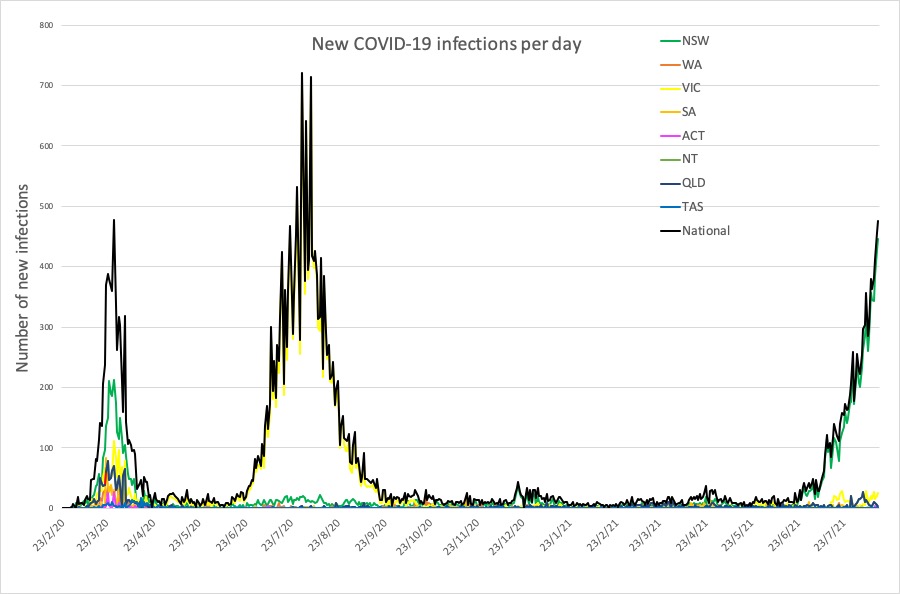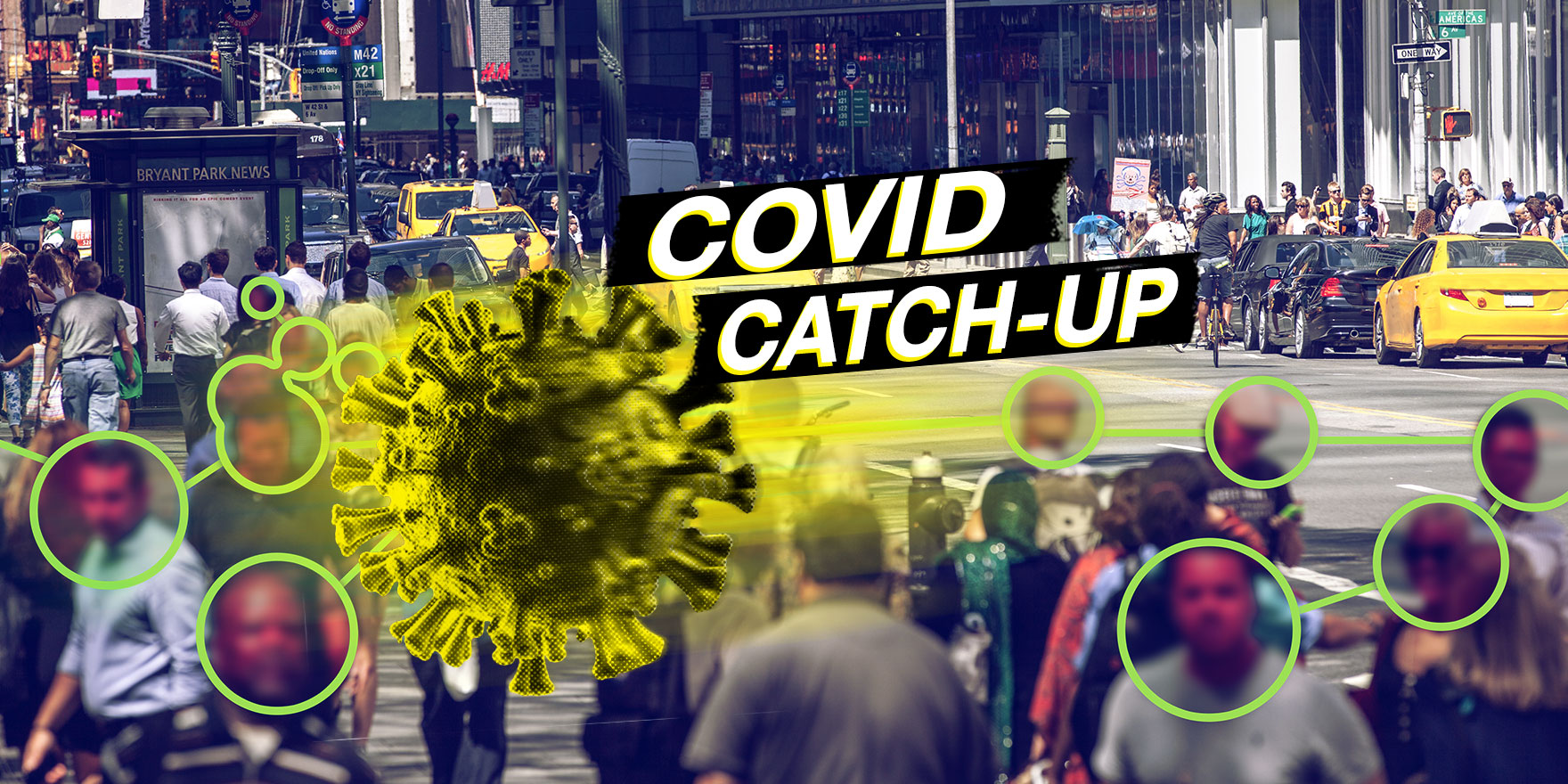And patients with haematological cancer are less likely to generate immune response to covid vaccines.
Welcome to The Medical Republic’s COVID Catch-Up.
It’s the day’s covid-19 news in one convenient post. Email bianca@biancanogrady.com with any tips, comments or feedback.
16 August
- More than one-third of covid infections are truly asymptomatic, research suggests.
- Patients with haematological cancers less likely to seroconvert after covid vaccination.
- US FDA authorises third vaccine dose for immunocompromised people.
- Q&A: what’s the experience of vaccine-associated myocarditis/pericarditis among 12-15-year-olds in the US and Israel?
- Latest covid-19 infection numbers from around Australia.
More than one-third of covid infections are truly asymptomatic, according to a meta-analysis of more than 350 studies.
A paper published in PNAS analysed studies involving more than 104,000 laboratory-confirmed infections, and estimated around 35% of those who tested positive never developed clinical symptoms over the course of their infection. At the time of testing, more than 42% of those being tested had no symptoms.
Children were much more likely to be truly asymptomatic than the elderly – around 46% of children compared to nearly 20% of the elderly – and those with comorbidities were less likely to be asymptomatic than those without underlying conditions.
“Higher representation of asymptomatic SARS-CoV-2 infections among younger people has grave implications for control policies in daycares, schools, and universities,” the authors wrote.
People with haematological malignancies – and particularly those being treated with monoclonal antibody therapies – may be less likely to generate an antibody response to covid vaccines, research suggests.
A study published in JAMA Oncology retrospectively looked at antibody levels following vaccination among 160 patients with haematologic cancers, two-thirds of whom were being treated with B-cell-depleting therapies such as rituximab, daratumumab or obinutuzumab.
Overall, just 39% tested positive for covid antibodies after vaccination, but among those being treated with B-cell-depleting therapies, 29% developed post-vaccination antibodies.
Patients with active malignancies were significantly less likely to develop antibodies than those in remission, as were those who had undergone chemotherapy within the previous 12 months.
Three patients developed covid despite being vaccinated, and one died.
“Our findings raise a concern that patients with hematologic cancers, particularly those receiving B-cell–depleting immunotherapy, may not gain adequate protection from vaccination, and as observed in our cohort, may still develop a potentially fatal infection,” the authors wrote.
Meanwhile, a second study in JAMA Oncology has found that vaccine-derived immunity may not last as long in people with cancer.
The study followed 95 patients with cancer and 66 healthy controls for 116-129 days after receiving their second vaccine dose. This showed that at follow-up, 100% of controls were seropositive for SARs-CoV-2 antibodies compared with 87% of cancer patients. Those with cancer also had significantly lower antibody levels than the control group and particularly those being treated with immunotherapy plus chemotherapy or biological therapies.
The US has advised that immunocompromised people should receive a third booster dose of mRNA covid vaccine, based on evidence that they don’t generate the same immune response to vaccination.
The advice applies to transplant recipients, those undergoing treatment for cancer, those on immunosuppressive therapies, and those with untreated or advanced HIV infection.
Q: What has been the experience in the US and Israel of using Pfizer in 12-16-year-olds, in terms of how many have been given Pfizer and the peri/myocarditis risks?
A: In the US, around 4.8 million adolescents aged 12-15 years have been fully vaccinated with the Pfizer vaccine, which represents about 31% of that age group. In Israel, around 26% of those aged 12-15 have been vaccinated with Pfizer. So far, Pfizer is the only vaccine approved for use in those aged under 16 years in these countries.
As of 16 July 2021, the US Vaccine Adverse Event Reporting System had received 397 reports of myocarditis from approximately 8.9 million adolescents aged 12-17 years who had received at least one dose of the Pfizer vaccine. This represented around 4.3% of all the adverse event reports for the vaccine in this age group.
Israel reported 148 cases of vaccine-associated myocarditis, but they don’t provide a breakdown of age other than to note that it most commonly affected younger men aged 16-30.
A recent case series of 15 children hospitalised with myocarditis after receiving the Pfizer vaccine noted that 14 were male, the median age was 15 years, and the most common symptoms were chest pain, fever, muscle aches and headache, which started 1-6 days after receiving the vaccine. Most cases were mild, none required intensive care, and the median length of stay in hospital was just two days.
(Thanks for the question, and keep them coming! The form for submitting questions is at the bottom of this post).
Here are the latest covid-19 infection numbers from around Australia to 9pm Sunday:
National – 39,096 with 958 deaths
ACT – 133 (3)
NSW – 13,503 (446)
NT – 199 (0)
QLD – 1955 (1)
SA – 868 (0)
TAS – 235 (0)
VIC – 21,144 (25)
WA – 1059 (0)



